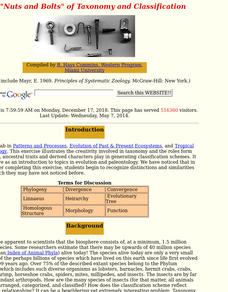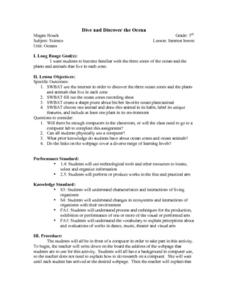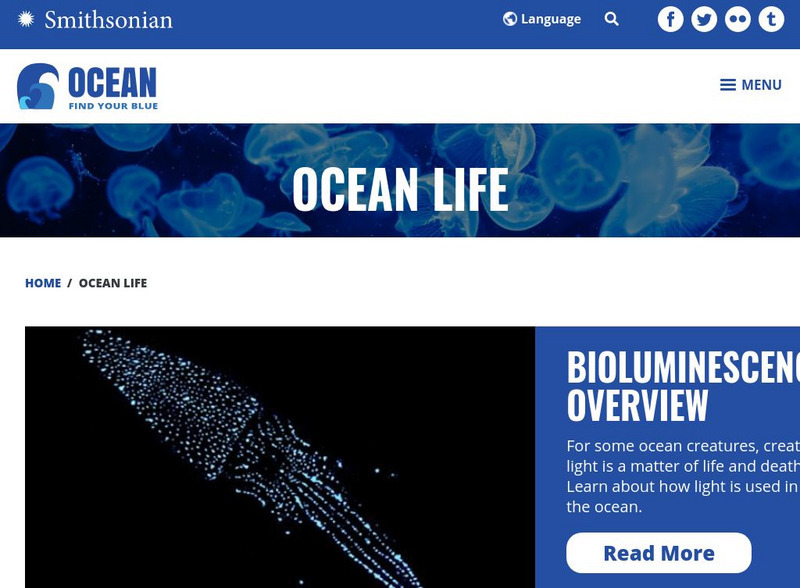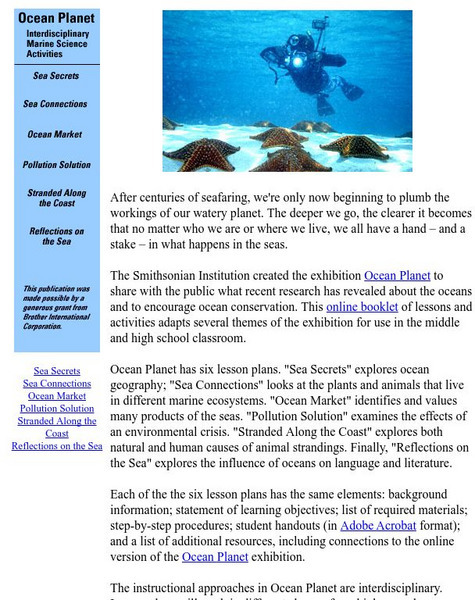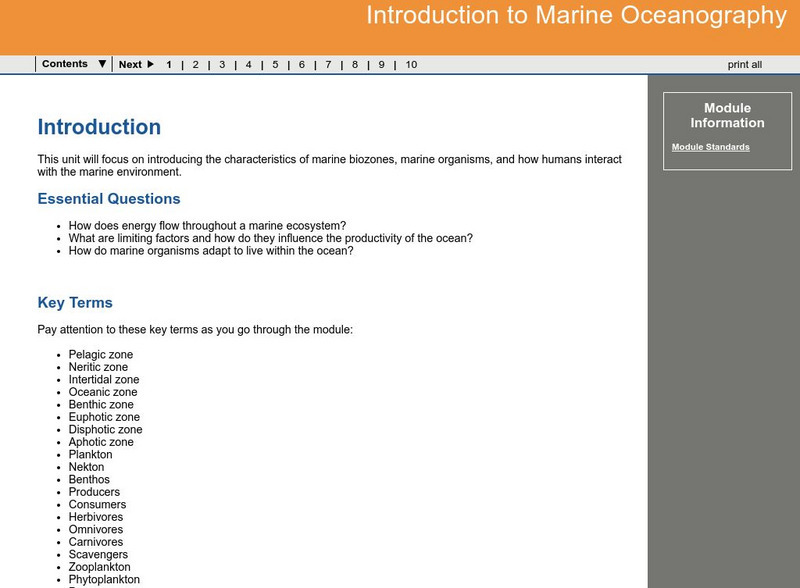Curated OER
Loggerhead Nest Management Program
Students identify the sea turtle management documentary and complete an activity for each slide. They plot the location of nests laid on the island they patrol and discuss their rationale for management decisions. Finally, students...
Curated OER
The "Nuts and Bolts" of Taxonomy and Classification
Students develop classification scheme that meets the established rules of the Linnaean system. They write one page essay on classification choices.
Curated OER
Going to Extremes
Pupils recognize that our ability to explore the extremes of the ocean is directly related to the technology of remote sensing. Students will recognize the deep submergence vehicle, Alvin, and the advanced sensors on board as tools for...
Curated OER
Dive and Discover the Ocean
Third graders investigate the three zones of the ocean and the plants and animals that live in each zone. Projects produced are shared with classmates in a share circle where the unique features of the animal and zone selected are...
Curated OER
Pollution Solution
Students explore the topic of oil pollution and how it affects the global ocean. They discuss oil spills in recent history and use problem solving skills to decide what strategies could be used to actually clean up an oil spill. Students...
Curated OER
Phragmites australis: Invasive Plant Species
Students research and investigate invasive species, with specific focus on the exotic plant Phargmites australis and its impact on Piermont Marsh near the community of Piermont, New York.
National Geographic
National Geographic: Symbiotic Relationships in Marine Ecosystems
For this lesson young scholars analyze videos to make observations about species, populations, and communities of organisms and discuss their symbiotic relationships. Then they create a hypothetical marine ecosystem and describe the...
Smithsonian Institution
National Museum of Natural History: Ocean Portal: Ocean Life & Ecosystems
From the tiny to the titanic, from the familiar to the undiscovered, the ocean offers a stunning diversity of marine life and nearly every kind of habitat imaginable. Dive in and explore them here. Links incude stories, videos and photos...
National Geographic
National Geographic: Marine Ecosystems and Biodiversity
In this unit students explore major marine ecosystems by locating them on maps. Students use marine examples to learn about energy transfer through food chains and food webs and then they discuss how food webs can illustrate the health...
American Museum of Natural History
American Museum of Natural History: O Logy: Marine Biology: The Living Oceans
This resource is a place for exploring, asking questions, finding information, meeting scientists, and learning about marine ecosystems.
National Geographic
National Geographic: Human Impacts on Marine Ecosystems
This lesson focuses on how human activities are impacting marine ecosystems. Includes handouts.
Smithsonian Institution
Smithsonian: Ocean Planet: Interdisciplinary Marine Science Activities
Smithsonian Institution presents ?Ocean Planet: Interdisciplinary Marine Science Activities?. Through this series of six interdisciplinary lessons, students will look at such things as the organisms in different marine ecosystems, the...
American Museum of Natural History
American Museum of Natural History: Milstein Hall of Ocean Life
Tour the museum's famed exhibition hall dedicated to ocean life at this online recreation. Find videos, maps, species specimens, and images that let you experience many of the museum's resources on ocean life right from your desktop.
Morning Earth
Biosphere as Place: Ocean Life Zones
Students investigate the Biology topic of ecosystems. The marine ecosystem tutorial consists of definitions, pictures, and examples of different ocean life zones.
National Geographic
National Geographic: Marine Food Webs
For this lesson, students learn about marine food webs and pyramids, and how energy flows through a marine ecosystem. They then research a marine organism and its role in a marine food web. The class pools their information to create a...
National Geographic
National Geographic: Marine Ecosystems and Biodiversity
A collection of three lessons where students learn about abiotic factors in marine ecosystems, about marine food chains and biodiversity, and about marine food webs and trophic levels. Includes handouts, website links, and a vocabulary...
National Geographic
National Geographic: Mapping Marine Ecosystems
Marine ecosystems are examined in this lesson. Students identify examples of different types and locate them on a world map. Includes handouts, website links, and a vocabulary list with definitions.
Smithsonian Institution
Smithsonian Learning Lab: Contrasts in Blue: Life on the Caribbean Coral Reef and the Rocky Coast of Maine
Smithsonian Education presents Contrasts in Blue: Life on the Caribbean Coral Reef and the Rocky Coast of Maine. Teachers can download this comprehensive teaching package in which students explore two marine ecosystems, the coral reefs...
Georgia Department of Education
Ga Virtual Learning: Marine Vertebrates
Learn about vertebrates found in the ocean, their individual methods of adaptations, identifying characteristics and contributions to the marine ecosystem.
Georgia Department of Education
Ga Virtual Learning: Marine Invertebrates
Students learn about invertebrates found in the ocean, their individual methods of adaptations, identifying characteristics, and contributions to the marine ecosystem.
BiologyWise
Biology Wise: Marine Biology Facts
Discusses the unique characteristics of the oceans and the many organisms that live in a marine ecosystem.
Virginia Institute of Marine Science
Virginia Institute of Marine Science: Ghostbusting in the Chesapeake
Because abandoned crab fishing pots can create havoc in the marine ecosystem, scientists and fishermen are researching ways in which to collect them. For this lesson students will explore catch data collected by the watermen from the...
Georgia Department of Education
Ga Virtual Learning: Introduction to Marine Oceanography
Students learn about marine biozones, marine organisms, and how humans interact with the marine environment.
Smithsonian Institution
Smithsonian Institution: Marine Science at the Smithsonian Institution
A site for networking many institutions, laboratories, and research groups working in the field of marine science. Has links to many scientists and their research interests.
Other popular searches
- Marine Ecosystem Food Chain
- Crude Oil Marine Ecosystem
- Marine Ecosystem Balance
- Marine Ecosystem Unit
- Marine Ecosystem Habitats
- Marine Ecosystem Underwater
- Illustrate Marine Ecosystem
- Marine Ecosystem Project

